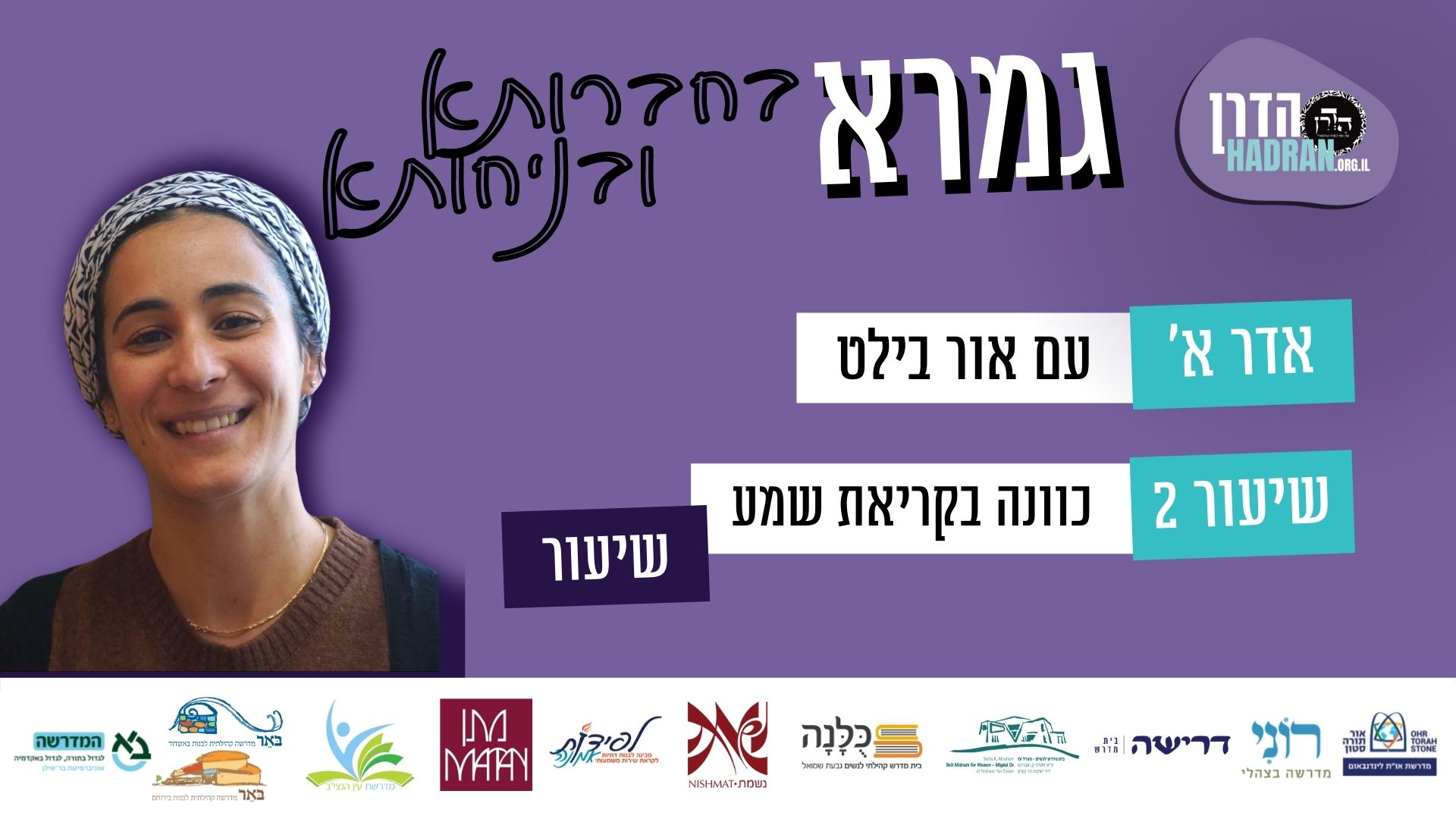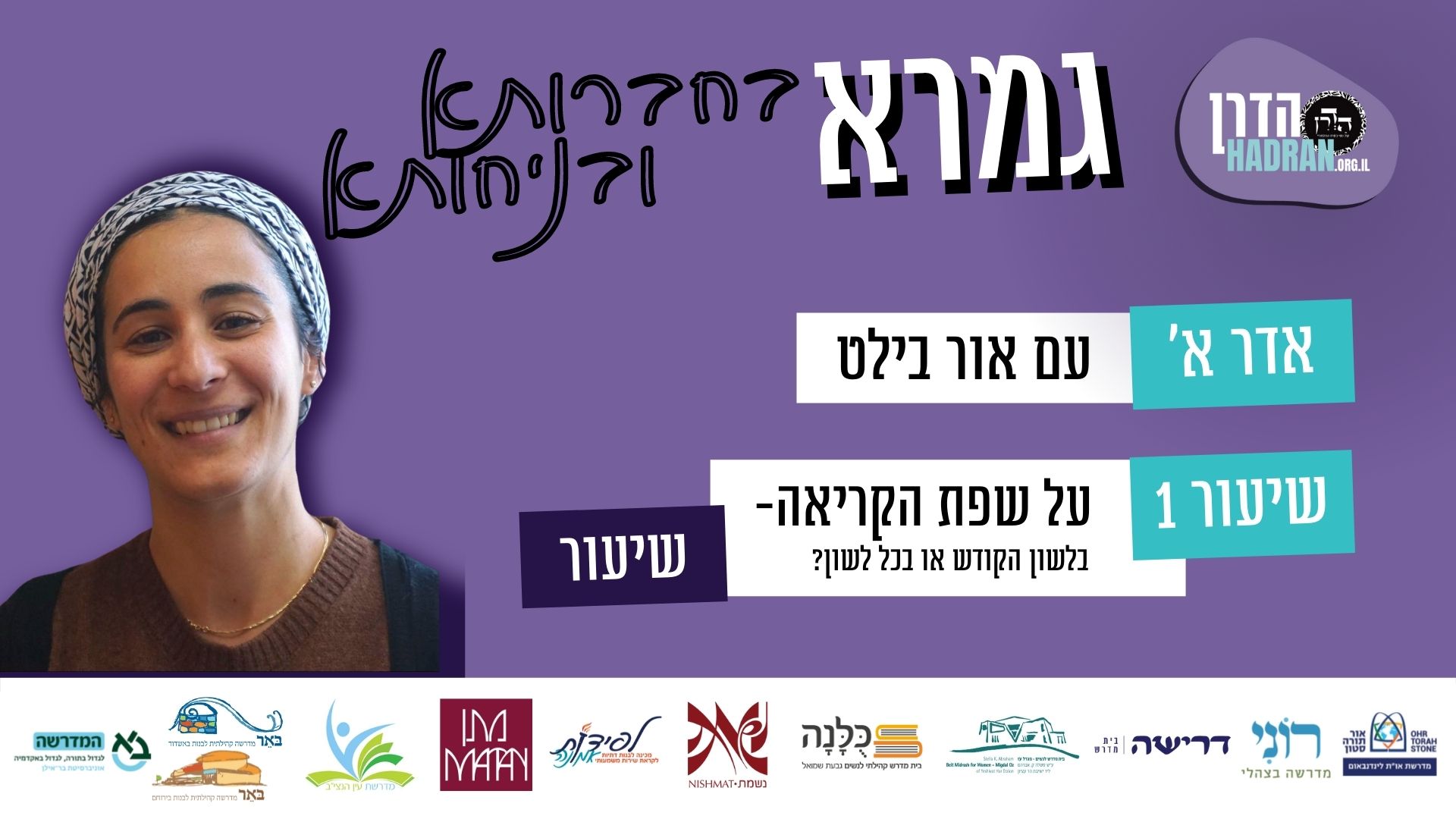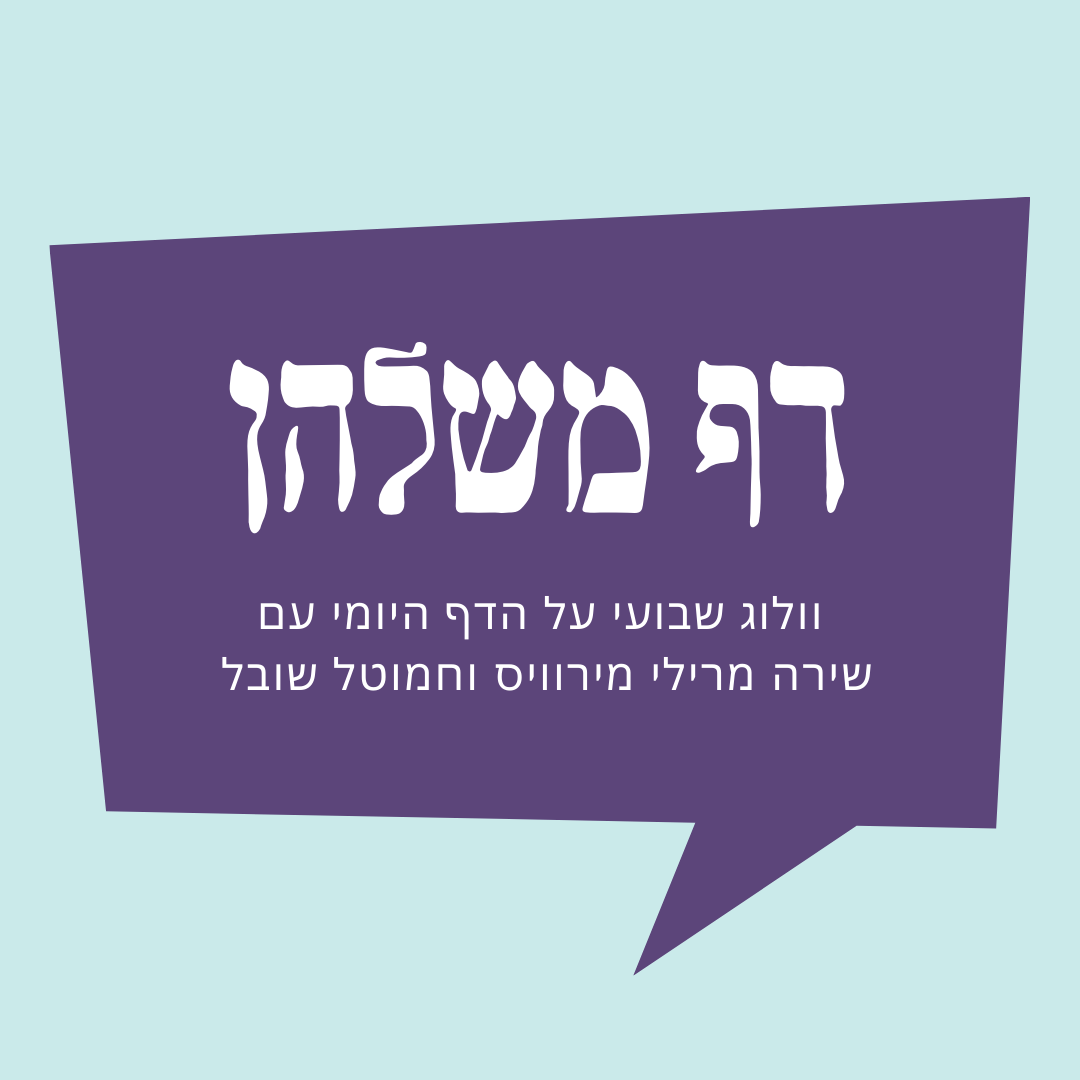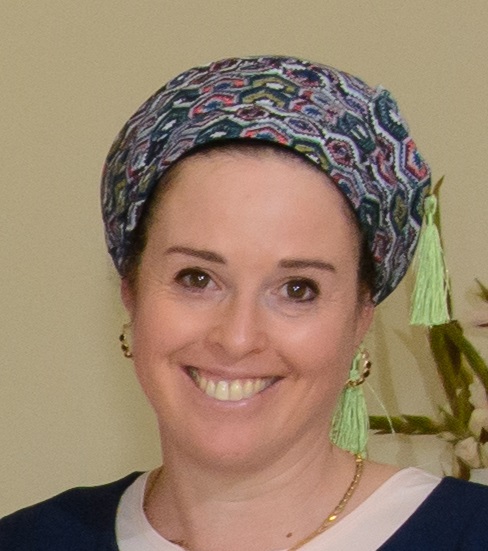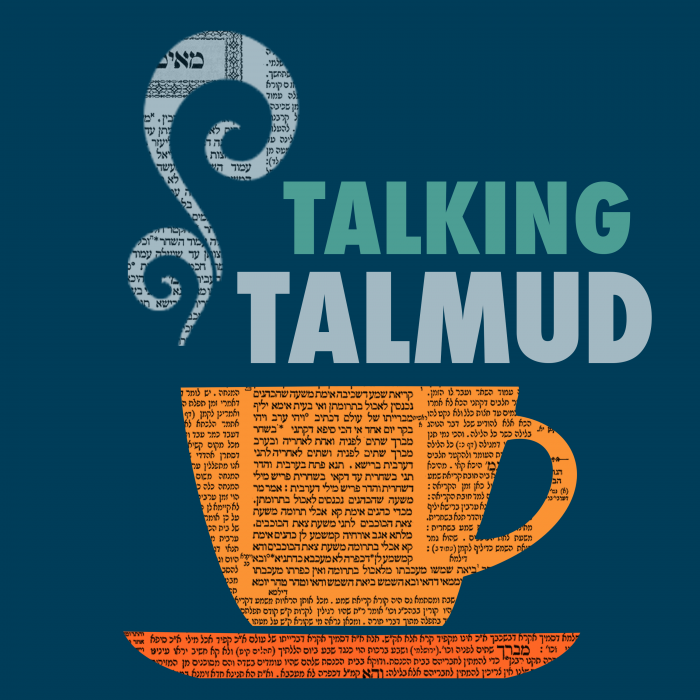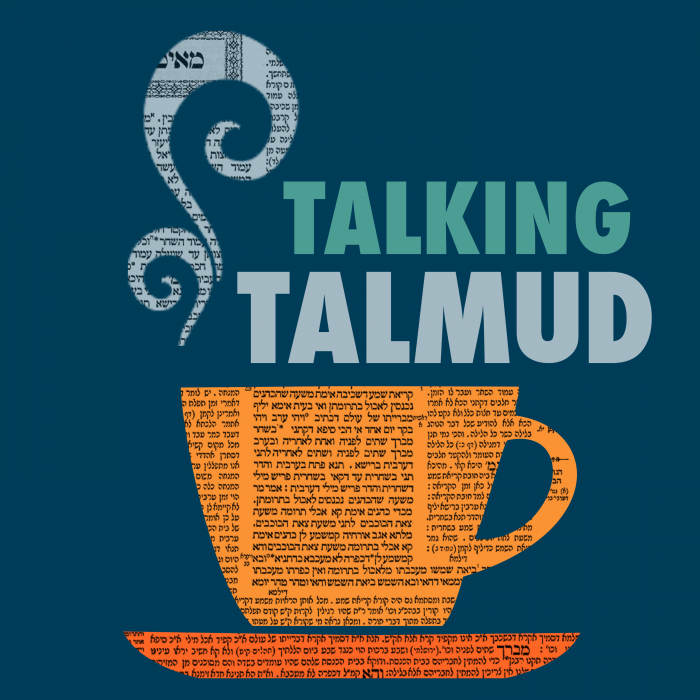מה עושים אם אוכלים בלי לברך – האם מברכים באמצע ארוחה? האם אפשרי לברך אחרי שכבר סיימו לאכול? הגמרא מדברת על חשיבותה של המשקה אפסרגוס שעשוי עם יין או שכר. יש כמה מקורות סותרים והגמרא מתרצת את הסתירות. יש שני אימרות מחכמים ששמעו הלכות/התנהגויות טובות/איזה מאכלים לאכול ממלאכים. יש חילוקי דעות לגבי הלכות קשורות לכוס של ברכה. בעקבות כך, מסופר סיפור עם ילתא, אשתו של רב נחמן שנעלבה מעולא ושוברת 400 חביות יין. המשנה מונה הרבה מחלוקות בין בית שמאי ובית הלל בנוגע להלכות סעודה.
רוצה להקדיש שיעור?
כלים
העמקה
רוצה להבין מה באמת קורה מתחת לפני השטח של הסוגיה?
שיעורים, פודקאסטים והרחבות של מיטב המורות שלנו יפתחו לך עוד זוויות וכיווני חשיבה.
חדשה בלימוד הגמרא?
זה הדף הראשון שלך? איזו התרגשות עצומה! יש לנו בדיוק את התכנים והכלים שיעזרו לך לעשות את הצעדים הראשונים ללמידה בקצב וברמה שלך, כך תוכלי להרגיש בנוח גם בתוך הסוגיות המורכבות ומאתגרות.
פסיפס הלומדות שלנו
גלי את קהילת הלומדות שלנו, מגוון נשים, רקעים וסיפורים. כולן חלק מתנועה ומסע מרגש ועוצמתי.
ברכות נא
בְּמִידֵּי דְּלָא מִמְּאִיס נָמֵי, לְסַלְּקִינְהוּ לְצַד אֶחָד וְלִיבָרֵךְ? תַּרְגְּמַהּ רַב יִצְחָק קַסְקְסָאָה קַמֵּיהּ דְּרַבִּי יוֹסֵי בַּר אָבִין מִשְּׁמֵיהּ דְּרַבִּי יוֹחָנָן: מִשּׁוּם שֶׁנֶּאֱמַר ״יִמָּלֵא פִי תְּהִלָּתֶךָ״.
The Gemara asks: With regard to a food item that does not become disgusting as well, let him shift it to the side and recite the blessing. Why need he spit it out? Rav Yitzḥak Kaskesa’a explained before Rabbi Yosei bar Avin, in the name of Rabbi Yoḥanan: One spits it out because it is stated: “My mouth will be filled with Your praise” (Psalms 71:8), meaning that one should recite God’s praises with his entire mouth, not merely half.
בְּעוֹ מִינֵּיהּ מֵרַב חִסְדָּא: מִי שֶׁאָכַל וְשָׁתָה וְלֹא בֵּרַךְ, מַהוּ שֶׁיַּחֲזוֹר וִיבָרֵךְ? אֲמַר לְהוּ: מִי שֶׁאָכַל שׁוּם וְרֵיחוֹ נוֹדֵף, יַחְזוֹר וְיֹאכַל שׁוּם אַחֵר כְּדֵי שֶׁיְּהֵא רֵיחוֹ נוֹדֵף?!
They raised a dilemma before Rav Ḥisda: One who ate and drank and did not recite a blessing, what is the ruling? Does he return and recite the blessing that he should have recited beforehand before he continues eating or not? In response, Rav Ḥisda said to them an analogy: Should one who ate garlic and the odor on his breath smells return and eat another garlic so that the odor on his breath will smell? That is to say, one must recite a blessing. Should one who committed a transgression and failed to recite a blessing before eating, remedy his situation by continuing to eat without reciting a blessing (Talmidei Rabbeinu Yona)?
אָמַר רָבִינָא: הִלְכָּךְ אֲפִילּוּ גָּמַר סְעוּדָּתוֹ, יַחְזוֹר וִיבָרֵךְ. דְּתַנְיָא: טָבַל וְעָלָה, אוֹמֵר בַּעֲלִיָּיתוֹ ״בָּרוּךְ אֲשֶׁר קִדְּשָׁנוּ בְּמִצְוֹתָיו וְצִוָּנוּ עַל הַטְּבִילָה״.
Ravina said: Therefore, even if one finished his meal, he must return and recite a blessing. He cites a proof, as it was taught in a baraita with regard to the laws of immersion: One who was ritually impure who immersed himself in a ritual bath and emerged, as he emerges he recites: Blessed…Who has made us holy through His mitzvot and has commanded us about ritual immersion. Evidently, in certain cases, one may recite the blessing after completing the act.
וְלָא הִיא, הָתָם — מֵעִיקָּרָא גַּבְרָא לָא חֲזֵי, הָכָא — מֵעִיקָּרָא גַּבְרָא חֲזֵי, וְהוֹאִיל וְאִידְּחִי — אִידְּחִי.
The Gemara rejects the parallel between the cases: That is not so, as there, in the case of immersion, initially, before he immersed himself, the man was unfit to recite the blessing because he was ritually impure; here, in the case where one did not recite a blessing before eating, initially he was fit to recite the blessing, and since he did not recite the blessing before he ate and he concluded his meal and is, therefore, excluded from reciting the blessing, he is completely excluded and has no way to remedy the situation.
תָּנוּ רַבָּנַן: אִסְפָּרָגוֹס — יָפֶה לַלֵּב וְטוֹב לָעֵינַיִם, וְכׇל שֶׁכֵּן לִבְנֵי מֵעַיִם. וְהָרָגִיל בּוֹ — יָפֶה לְכׇל גּוּפוֹ. וְהַמִּשְׁתַּכֵּר הֵימֶנּוּ — קָשֶׁה לְכׇל גּוּפוֹ.
Tangential to the laws concerning wine that the Gemara cited earlier, the Sages taught: Asparagus, wine or other alcoholic beverages that they were accustomed to drink early in the morning before eating, is agreeable for the heart and beneficial for the eyes, and all the more so for the intestines. And in extolling the virtues of this drink, the Gemara says: One who is accustomed to drink it, it is agreeable for his entire body. However, one must be careful, as one who drinks excessively and becomes drunk, it is harmful for his entire body.
מִדְּקָתָנֵי יָפֶה לַלֵּב, מִכְּלָל דִּבְחַמְרָא עָסְקִינַן, וְקָתָנֵי: וְכׇל שֶׁכֵּן לִבְנֵי מֵעַיִם. וְהָתַנְיָא: לְלַעַ״ט — יָפֶה, לְרָמַ״ת — קָשֶׁה!
The Gemara discusses this: From the fact that it was taught that asparagus is agreeable for the heart, it may be inferred that we are dealing with asparagus made from wine, which is known to be agreeable for the heart. And we learned: And all the more so, asparagus is beneficial for the intestines. Wasn’t it taught in a baraita: For L-E-T, which is an acronym for lev, heart; einayim, eyes; teḥol, spleen, it is beneficial, but for R-M-T, rosh, head; me’ayim, intestines; taḥtoniot, hemorrhoids, it is harmful. Apparently, asparagus is harmful for one’s intestines.
כִּי תַּנְיָא הַהִיא, בִּמְיוּשָּׁן. כְּדִתְנַן: קֻוֽנָּם יַיִן שֶׁאֲנִי טוֹעֵם, שֶׁהַיַּיִן קָשֶׁה לִבְנֵי מֵעַיִם. אָמְרוּ לוֹ: וַהֲלֹא מְיוּשָּׁן יָפֶה הוּא לִבְנֵי מֵעַיִם! וְשָׁתַק — אָסוּר בְּחָדָשׁ, וּמוּתָּר בִּמְיוּשָּׁן. שְׁמַע מִינַּהּ.
The Gemara responds: That baraita, in which it was taught that asparagus is beneficial to one’s intestines, refers to asparagus made with old wine. As we learned in the mishna concerning the laws of vows that one who vowed: Wine is konam for me to taste because it is harmful to the intestines, and those who heard him said to him: But isn’t old wine beneficial to the intestines? If he was silent and did not argue the point, he is forbidden to drink new wine because of his vow, but he is permitted to drink old wine. Conclude from this that old wine is beneficial for the intestines.
תָּנוּ רַבָּנַן: שִׁשָּׁה דְּבָרִים נֶאֶמְרוּ בְּאִסְפָּרָגוֹס: אֵין שׁוֹתִין אוֹתוֹ אֶלָּא כְּשֶׁהוּא חַי וּמָלֵא; מְקַבְּלוֹ בְּיָמִין וְשׁוֹתֵהוּ בִּשְׂמֹאל; וְאֵין מְשִׂיחִין אַחֲרָיו, וְאֵין מַפְסִיקִין בּוֹ; וְאֵין מַחֲזִירִין אוֹתוֹ אֶלָּא לְמִי שֶׁנָּתְנוּ לוֹ; וְרָק אַחֲרָיו; וְאֵין סוֹמְכִין אוֹתוֹ אֶלָּא בְּמִינוֹ.
The Sages taught: Six things were said with regard to asparagus: One only drinks it undiluted and from a full cup; he receives it from the attendant in his right hand and drinks it with his left hand; one should not converse after drinking it and one does not stop while drinking it, but should drink it all at once; one only returns it to the one who gave it to him; and he spits after drinking it; and one may only supplement it with its own kind, meaning that after drinking asparagus, one should only eat something that is used to make similar beverages, e.g., dates after date beer, etc.
וְהָתַנְיָא אֵין סוֹמְכִין אוֹתוֹ אֶלָּא בְּפַת! לָא קַשְׁיָא, הָא — בִּדְחַמְרָא, הָא — בִּדְשִׁכְרָא.
The Gemara challenges: Wasn’t it taught in a baraita that one may only supplement asparagus with bread? The Gemara responds: That is not difficult. This baraita, in which it was taught that one supplements it with bread, refers to asparagus made of wine, while that baraita, in which it was taught that one supplements it with its own kind, refers to asparagus made of beer.
תָּנֵי חֲדָא לְלַעַ״ט יָפֶה, לְרָמַ״ת קָשֶׁה. וְתַנְיָא אִידַּךְ: לְרָמַ״ת יָפֶה, לְלַעַ״ט קָשֶׁה! לָא קַשְׁיָא, הָא — בִּדְחַמְרָא, הָא — בִּדְשִׁכְרָא.
It was taught in one baraita that asparagus is beneficial for L-E-T, heart, eyes, and spleen, and harmful for R-M-T, head, intestines, and hemorrhoids. And it was taught in another baraita that asparagus is beneficial for R-M-T, head, intestines, and hemorrhoids, and harmful for L-E-T, heart, eyes, and spleen. The Gemara responds: That is not difficult. This baraita, in which it was taught that asparagus is beneficial for L-E-T, refers to asparagus made of wine, while that baraita, in which it was taught that asparagus is harmful for L-E-T, refers to asparagus made of beer.
תָּנֵי חֲדָא: רָק אַחֲרָיו — לוֹקֶה. וְתַנְיָא אִידַּךְ: לֹא רָק אַחֲרָיו — לוֹקֶה! לָא קַשְׁיָא, הָא — בִּדְחַמְרָא, הָא — בִּדְשִׁכְרָא.
The Gemara resolves a contradiction between two other baraitot in the same manner. It was taught in one baraita that if he spit after drinking asparagus, he suffers an illness. And it was taught in another baraita that if he did not spit after drinking asparagus, he suffers an illness. The Gemara responds: That is not difficult. This baraita, in which it was taught that if he spit after drinking it he suffers an illness, refers to asparagus made of wine, while that baraita, in which it was taught that if he did not spit he suffers an illness, refers to asparagus made of beer.
אָמַר רַב אָשֵׁי: הַשְׁתָּא דְּאָמְרַתְּ לֹא רָק אַחֲרָיו לוֹקֶה, מֵימָיו נִזְרָקִין אֲפִילּוּ בִּפְנֵי הַמֶּלֶךְ.
Rav Ashi said: Now that you said that if he did not spit after drinking it he suffers an illness, its water, the saliva in his mouth after drinking asparagus, may be expelled even when standing before the king, as failure to do so will endanger him.
אָמַר רַבִּי יִשְׁמָעֵאל בֶּן אֱלִישָׁע: שְׁלֹשָׁה דְּבָרִים סָח לִי סוּרִיאֵל שַׂר הַפָּנִים: אַל תִּטּוֹל חֲלוּקְךָ בְּשַׁחֲרִית מִיַּד הַשַּׁמָּשׁ וְתִלְבַּשׁ. וְאַל תִּטּוֹל יָדֶיךָ מִמִּי שֶׁלֹּא נָטַל יָדָיו. וְאַל תַּחֲזִיר כּוֹס אִסְפָּרָגוֹס אֶלָּא לְמִי שֶׁנְּתָנוֹ לְךָ — מִפְּנֵי שֶׁתַּכְסְפִית, וְאָמְרִי לַהּ, אִסְתַּלְגָּנִית שֶׁל מַלְאֲכֵי חַבָּלָה מְצַפִּין לוֹ לָאָדָם, וְאוֹמְרִים: אֵימָתַי יָבֹא אָדָם לִידֵי אֶחָד מִדְּבָרִים הַלָּלוּ וְיִלָּכֵד.
Rabbi Yishmael ben Elisha said: Suriel, the heavenly ministering angel of the Divine Presence, told me three things from on high: Do not take your cloak in the morning from the hand of your servant and wear it; do not ritually wash your hands from one who has not ritually washed his own hands; and only return a cup of asparagus to the one who gave it to you. Why is this? Because a band of demons and some say a band of angels of destruction lie in wait for a person and say: When will a person encounter one of these circumstances and be captured?
אָמַר רַבִּי יְהוֹשֻׁעַ בֶּן לֵוִי, שְׁלֹשָׁה דְּבָרִים סָח לִי מַלְאַךְ הַמָּוֶת: אַל תִּטּוֹל חֲלוּקְךָ שַׁחֲרִית מִיַּד הַשַּׁמָּשׁ וְתִלְבַּשׁ. וְאַל תִּטּוֹל יָדֶיךָ מִמִּי שֶׁלֹּא נָטַל יָדָיו. וְאַל תַּעֲמוֹד לִפְנֵי הַנָּשִׁים בְּשָׁעָה שֶׁחוֹזְרוֹת מִן הַמֵּת, מִפְּנֵי שֶׁאֲנִי מְרַקֵּד וּבָא לִפְנֵיהֶן וְחַרְבִּי בְּיָדַי וְיֵשׁ לִי רְשׁוּת לְחַבֵּל.
Similarly, the Gemara relates that Rabbi Yehoshua ben Levi said: The Angel of Death told me three things: Do not take your cloak in the morning from the hand of your servant and wear it; do not ritually wash your hands from one who has not ritually washed his own hands; and do not stand before the women when they return from the burial of the deceased, because I dance and come before them and my sword is in hand, and I have license to destroy.
וְאִי פָּגַע, מַאי תַּקַּנְתֵּיהּ? לִינְשׁוֹף מִדּוּכְתֵּיהּ אַרְבַּע אַמּוֹת, אִי אִיכָּא נַהֲרָא — לֶיעְבְּרֵיהּ, וְאִי אִיכָּא דַּרְכָּא אַחֲרִינָא — לֵיזִיל בַּהּ, וְאִי אִיכָּא גּוּדָא — לֵיקוּ אֲחוֹרָא, וְאִי לָא — לַיהְדַּר אַפֵּיהּ וְלֵימָא: ״וַיֹּאמֶר ה׳ אֶל הַשָּׂטָן יִגְעַר ה׳ בְּךָ וְגוֹ׳״ עַד דְּחָלְפִי מִינֵּיהּ.
The Gemara asks: And if one encounters women returning from a funeral, what is his remedy? The Gemara answers: Let him jump four cubits from where he stands; if there is a river, let him cross it; if there is another path, let him go down it; if there is a wall, let him stand behind it; and if not, he should turn his face around and recite the verse: “And the Lord said to the Satan: The Lord rebukes you, Satan, the Lord that has chosen Jerusalem rebukes you; is not this man a brand plucked from the fire?” (Zechariah 3:2), until they pass him.
אָמַר רַבִּי זֵירָא אָמַר רַבִּי אֲבָהוּ, וְאָמְרִי לַהּ בְּמַתְנִיתָא תָּנָא: עֲשָׂרָה דְּבָרִים נֶאֶמְרוּ בְּכוֹס שֶׁל בְּרָכָה: טָעוּן הַדָּחָה וּשְׁטִיפָה. חַי וּמָלֵא. עִיטּוּר וְעִיטּוּף. נוֹטְלוֹ בִּשְׁתֵּי יָדָיו, וְנוֹתְנוֹ בַּיָּמִין. וּמַגְבִּיהוֹ מִן הַקַּרְקַע טֶפַח, וְנוֹתֵן עֵינָיו בּוֹ. וְיֵשׁ אוֹמְרִים: אַף מְשַׁגְּרוֹ בְּמַתָּנָה לְאַנְשֵׁי בֵיתוֹ.
Rabbi Zeira said that Rabbi Abbahu said, and some say that this halakha was taught in a baraita: Ten things were said with regard to a cup of blessing, e.g., the cup of wine over which Grace after Meals is recited: It requires rinsing and washing; it must be undiluted wine, and full; it requires adorning and wrapping; he takes it in his two hands and places it in his right hand, and he lifts it at least one handbreadth from the ground, and when reciting the blessing he fixes his eyes upon it. And some say: He also sends it as a gift to members of his household.
אָמַר רַבִּי יוֹחָנָן: אָנוּ אֵין לָנוּ אֶלָּא אַרְבָּעָה בִּלְבַד: הֲדָחָה, שְׁטִיפָה, חַי, וּמָלֵא. תָּנָא: הֲדָחָה — מִבִּפְנִים, וּשְׁטִיפָה — מִבַּחוּץ.
Rabbi Yoḥanan said: We only have four of those ten things: Rinsing, washing, the wine must be undiluted, and the cup must be full. In explanation, it was taught: Rinsing is from the inside of the cup, and washing is from the outside of the cup.
אָמַר רַבִּי יוֹחָנָן: כׇּל הַמְבָרֵךְ עַל כּוֹס מָלֵא — נוֹתְנִין לוֹ נַחֲלָה בְּלִי מְצָרִים, שֶׁנֶּאֱמַר: ״וּמָלֵא בִּרְכַּת ה׳ יָם וְדָרוֹם יְרָשָׁה״. רַבִּי יוֹסֵי בַּר חֲנִינָא אוֹמֵר: זוֹכֶה וְנוֹחֵל שְׁנֵי עוֹלָמִים, הָעוֹלָם הַזֶּה וְהָעוֹלָם הַבָּא.
Rabbi Yoḥanan said: Anyone who recites a blessing over a full cup, they give him a boundless inheritance, as it is stated: “And full of the blessing of the Lord, possess the sea and the south” (Deuteronomy 33:23), indicating that one whose cup is full will receive God’s blessing and will inherit from all sides. Rabbi Yosei bar Ḥanina says: He merits and inherits two worlds, this world and the World-to-Come.
עִיטּוּר. רַב יְהוּדָה מְעַטְּרֵהוּ בְּתַלְמִידִים, רַב חִסְדָּא מְעַטַּר לֵיהּ בְּנַטְלֵי. אָמַר רַבִּי חָנָן: וּבְחַי. אָמַר רַב שֵׁשֶׁת: וּבְבִרְכַּת הָאָרֶץ.
The Gemara continues explaining the ten things said with regard to the cup of blessing: The Sages would adorn the cup of blessing in different ways. Rav Yehuda would adorn it with students, as when he recited the blessing he would surround himself with students to accord honor to the blessing. Rav Ḥisda, however, would adorn it with other cups; he would surround the cup of blessing with other cups. Rabbi Ḥanan said: And specifically with undiluted wine. Rav Sheshet said: And in the blessing of the land.
עִיטּוּף. רַב פָּפָּא מִעַטַּף וְיָתֵיב. רַב אַסִּי פָּרֵיס סוּדָרָא עַל רֵישֵׁיהּ.
The Sages also had different customs with regard to wrapping. Rav Pappa would wrap himself in his prayer shawl and sit and recite Grace after Meals. Rav Asi spread a cloth on his head as an sign of respect.
נוֹטְלוֹ בִּשְׁתֵּי יָדָיו. אָמַר רַבִּי חִינָּנָא בַּר פָּפָּא: מַאי קְרָאָה? — ״שְׂאוּ יְדֵיכֶם קֹדֶשׁ וּבָרְכוּ אֶת ה׳״.
With regard to what was said that he takes it in his two hands, Rabbi Ḥinnana bar Pappa said: What is the verse that proves this? As it is stated: “Lift your hands in holiness and bless the Lord” (Psalms 134:2).
וְנוֹתְנוֹ לַיָּמִין. אָמַר רַבִּי חִיָּיא בַּר אַבָּא אָמַר רַבִּי יוֹחָנָן: רִאשׁוֹנִים שָׁאֲלוּ: שְׂמֹאל מַהוּ שֶׁתְּסַיֵּיעַ לַיָּמִין? אָמַר רַב אָשֵׁי: הוֹאִיל וְרִאשׁוֹנִים אִיבַּעְיָא לְהוּ וְלֹא אִיפְּשִׁט לְהוּ,
As for what was said after he takes it in his two hands: And he places it in his right hand, Rabbi Ḥiyya bar Abba said that Rabbi Yoḥanan said: The early Sages asked: What is the ruling, may the left hand assist the right when taking the cup? Rav Ashi said: Since the early Sages raised this dilemma and it was not resolved for them,
אֲנַן נַעֲבֵד לְחוּמְרָא.
we will act stringently and not assist the right hand with the left.
וּמַגְבִּיהוֹ מִן הַקַּרְקַע טֶפַח. אָמַר רַב אַחָא בְּרַבִּי חֲנִינָא: מַאי קְרָאָה — ״כּוֹס יְשׁוּעוֹת אֶשָּׂא וּבְשֵׁם ה׳ אֶקְרָא״.
And he lifts it at least one handbreadth from the ground. Rav Aḥa, son of Rabbi Ḥanina, says: What is the verse that proves this? “I will lift the cup of salvation and upon the name of the Lord I will call” (Psalms 116:13).
וְנוֹתֵן עֵינָיו בּוֹ — כִּי הֵיכִי דְּלָא נַיסַּח דַּעְתֵּיהּ מִינֵּיהּ.
And he fixes his eyes upon the cup; so that his attention will not be distracted from it.
וּמְשַׁגְּרוֹ לְאַנְשֵׁי בֵּיתוֹ בְּמַתָּנָה — כִּי הֵיכִי דְּתִתְבָּרַךְ דְּבֵיתְהוּ.
And he sends it as a gift to members of his household; so that his wife will be blessed.
עוּלָּא אִקְּלַע לְבֵי רַב נַחְמָן. כְּרֵיךְ רִיפְתָּא, בָּרֵיךְ בִּרְכַּת מְזוֹנָא, יְהַב לֵיהּ כָּסָא דְּבִרְכְּתָא לְרַב נַחְמָן. אֲמַר לֵיהּ רַב נַחְמָן: לִישַׁדַּר מָר כָּסָא דְבִרְכְּתָא לְיַלְתָּא. אֲמַר לֵיהּ: הָכִי אָמַר רַבִּי יוֹחָנָן: אֵין פְּרִי בִטְנָהּ שֶׁל אִשָּׁה מִתְבָּרֵךְ אֶלָּא מִפְּרִי בִּטְנוֹ שֶׁל אִישׁ, שֶׁנֶּאֱמַר ״וּבֵרַךְ פְּרִי בִטְנְךָ״. ״פְּרִי בִטְנָהּ״ לֹא נֶאֱמַר, אֶלָּא ״פְּרִי בִטְנְךָ״.
The Gemara relates: Ulla happened to come to the house of Rav Naḥman. He ate bread, recited Grace after Meals, and gave the cup of blessing to Rav Naḥman. Rav Naḥman said to him: Master, please send the cup of blessing to Yalta, my wife. Ulla responded to him: There is no need, as Rabbi Yoḥanan said as follows: The fruit of a woman’s body is blessed only from the fruit of a man’s body, as it is stated: “And He will love you, and bless you, and make you numerous, and He will bless the fruit of your body” (Deuteronomy 7:13). The Gemara infers: “He will bless the fruit of her body” was not stated. Rather, “He will bless the fruit of your [masculine singular] body.” For his wife to be blessed with children, it is sufficient to give the cup to Rav Naḥman.
תַּנְיָא נָמֵי הָכִי, רַבִּי נָתָן אוֹמֵר: מִנַּיִן שֶׁאֵין פְּרִי בִטְנָהּ שֶׁל אִשָּׁה מִתְבָּרֵךְ אֶלָּא מִפְּרִי בִּטְנוֹ שֶׁל אִישׁ — שֶׁנֶּאֱמַר: ״וּבֵרַךְ פְּרִי בִטְנְךָ״, ״פְּרִי בִטְנָהּ״ לֹא נֶאֱמַר, אֶלָּא ״פְּרִי בִטְנְךָ״.
That opinion was also taught in a baraita: Rabbi Natan says: From where is it derived that the fruit of a woman’s body is only blessed from the fruit of a man’s body? As it is stated: And He will bless the fruit of your body; He will bless the fruit of her body was not stated. Rather, He will bless the fruit of your body.
אַדְּהָכִי שְׁמַעָה יַלְתָּא, קָמָה בְּזִיהֲרָא, וְעַלַּת לְבֵי חַמְרָא, וּתְבַרָא אַרְבַּע מְאָה דַּנֵּי דְחַמְרָא. אֲמַר לֵיהּ רַב נַחְמָן: נְשַׁדַּר לַהּ מָר כָּסָא אַחֲרִינָא, שְׁלַח לַהּ: כֹּל הַאי נַבְגָּא, דְּבִרְכְּתָא הִיא. שְׁלַחָה לֵיהּ: מִמְּהַדּוּרֵי — מִילֵּי, וּמִסְּמַרְטוּטֵי — כַּלְמֵי.
The Gemara relates that meanwhile Yalta heard Ulla’s refusal to send her the cup of blessing. Yalta was the daughter of the Exilarch and was accustomed to being treated with deference, so she arose in a rage, entered the wine-storage, and broke four hundred barrels of wine. Afterward, Rav Naḥman said to Ulla: Let the Master send her another cup. Ulla sent Yalta a different cup with a message saying that all of the wine in this barrel is wine of blessing; although you did not drink from the cup of blessing itself, you may at least drink from the barrel from which the cup of blessing was poured. She sent him a stinging response: From itinerant peddlers, Ulla traveled regularly from Eretz Yisrael to Babylonia and back, come meaningless words, and from rags come lice.
אָמַר רַב אַסִּי: אֵין מַסִּיחִין עַל כּוֹס שֶׁל בְּרָכָה. וְאָמַר רַב אַסִּי: אֵין מְבָרְכִין עַל כּוֹס שֶׁל פּוּרְעָנוּת. מַאי ״כּוֹס שֶׁל פּוּרְעָנוּת״? אָמַר רַב נַחְמָן בַּר יִצְחָק: כּוֹס שֵׁנִי. תַּנְיָא נָמֵי הָכִי: הַשּׁוֹתֶה כִּפְלַיִם לֹא יְבָרֵךְ, מִשּׁוּם שֶׁנֶּאֱמַר ״הִכּוֹן לִקְרַאת אֱלֹהֶיךָ יִשְׂרָאֵל״, וְהַאי לָא מְתַקַּן.
Rav Asi said: One may not speak over a cup of blessing from the moment he takes it in his hand until he drinks it. And Rav Asi said: One may not recite a blessing over a cup of punishment. The Gemara clarifies: What is a cup of punishment? Rav Naḥman bar Yitzḥak said: A second cup. That opinion was also taught in a baraita: One who drinks in pairs should not recite a blessing, because it is stated: “Prepare to meet your God, O Israel” (Amos 4:12). One must be well-prepared in order to stand before his Creator, and this person who drank two cups of wine is not prepared, as drinking an even number of cups of wine is dangerous due to demons.
אָמַר רַבִּי אֲבָהוּ, וְאָמְרִי לַהּ בְּמַתְנִיתָא תָּנָא: הָאוֹכֵל וּמְהַלֵּךְ מְבָרֵךְ מְעוּמָּד, וּכְשֶׁהוּא אוֹכֵל מְעוּמָּד — מְבָרֵךְ מְיוּשָּׁב, וּכְשֶׁהוּא מֵיסֵב וְאוֹכֵל — יוֹשֵׁב וּמְבָרֵךְ. וְהִלְכְתָא בְּכוּלְּהוּ יוֹשֵׁב וּמְבָרֵךְ.
In concluding the halakhot of blessings, the Gemara cites that Rabbi Abbahu said, and some say it was taught in a baraita: One who eats and walks, recites the blessing of Grace after Meals standing in one place, and one who eats standing, recites the blessing while seated, and one who eats reclining on a divan sits and then recites the blessing. And the halakha is: In all of these cases one sits and then recites the blessing.
הדרן עלך שלשה שאכלו
מַתְנִי׳ אֵלּוּ דְּבָרִים שֶׁבֵּין בֵּית שַׁמַּאי וּבֵין בֵּית הִלֵּל בַּסְּעוּדָה: בֵּית שַׁמַּאי אוֹמְרִים: מְבָרֵךְ עַל הַיּוֹם, וְאַחַר כָּךְ מְבָרֵךְ עַל הַיַּיִן. וּבֵית הִלֵּל אוֹמְרִים: מְבָרֵךְ עַל הַיַּיִן וְאַחַר כָּךְ מְבָרֵךְ עַל הַיּוֹם.
MISHNA: These are the matters of dispute between Beit Shammai and Beit Hillel with regard to the halakhot of a meal: One dispute concerns the order of blessings in kiddush. Beit Shammai say: When one recites kiddush over wine, one recites a blessing over the sanctification of the day and recites a blessing over the wine thereafter. And Beit Hillel say: One recites a blessing over the wine and recites a blessing over the day thereafter.
בֵּית שַׁמַּאי אוֹמְרִים: נוֹטְלִין לַיָּדַיִם וְאַחַר כָּךְ מוֹזְגִין אֶת הַכּוֹס. וּבֵית הִלֵּל אוֹמְרִים: מוֹזְגִין אֶת הַכּוֹס וְאַחַר כָּךְ נוֹטְלִין לַיָּדַיִם.
Similarly, Beit Hillel and Beit Shammai disagree with regard to drinking wine before a meal. Beit Shammai say: One washes his hands and mixes water with the wine in the cup thereafter, and Beit Hillel say: One mixes water with the wine in the cup and only washes his hands thereafter. The basis of this particular dispute is with regard to the laws of ritual purity, as the Gemara will explain below.
בֵּית שַׁמַּאי אוֹמְרִים: מְקַנֵּחַ יָדָיו בַּמַּפָּה, וּמַנִּיחָהּ עַל הַשּׁוּלְחָן. וּבֵית הִלֵּל אוֹמְרִים: עַל הַכֶּסֶת.
Also with regard to the laws of ritual purity, Beit Shammai say: After washing, one dries his hands with a cloth and places it on the table. And Beit Hillel say: One places it on the cushion upon which he is sitting.
בֵּית שַׁמַּאי אוֹמְרִים: מְכַבְּדִין אֶת הַבַּיִת, וְאַחַר כָּךְ נוֹטְלִין לַיָּדַיִם. וּבֵית הִלֵּל אוֹמְרִים: נוֹטְלִין לַיָּדַיִם, וְאַחַר כָּךְ מְכַבְּדִין אֶת הַבַּיִת.
Similarly, Beit Shammai say: One sweeps the area of the house where the meal took place and he washes his hands with the final waters before Grace after Meals thereafter. And Beit Hillel say: One washes his hands and sweeps the house thereafter.
בֵּית שַׁמַּאי אוֹמְרִים: נֵר וּמָזוֹן, בְּשָׂמִים וְהַבְדָּלָה. וּבֵית הִלֵּל אוֹמְרִים: נֵר וּבְשָׂמִים, מָזוֹן וְהַבְדָּלָה.
Just as they dispute the order of the blessings in kiddush, they dispute the order of the blessings in havdala. If a meal continued until the conclusion of Shabbat, Beit Shammai say: One recites the blessing over the candle, then the Grace after Meals blessing, then the blessing over the spices, and finally the blessing of havdala. And Beit Hillel say: The order is candle, spices, Grace after Meals, and havdala.
בֵּית שַׁמַּאי אוֹמְרִים: ״שֶׁבָּרָא מְאוֹר הָאֵשׁ״, וּבֵית הִלֵּל אוֹמְרִים: ״בּוֹרֵא מְאוֹרֵי הָאֵשׁ״.
With regard to the blessing over the candle, Beit Shammai say: Who created [bara] the light of fire. And Beit Hillel say: Who creates [boreh] the lights of fire.
אֵין מְבָרְכִין לֹא עַל הַנֵּר וְלֹא עַל הַבְּשָׂמִים שֶׁל גּוֹיִם, וְלֹא עַל הַנֵּר וְלֹא עַל הַבְּשָׂמִים שֶׁל מֵתִים, וְלֹא עַל הַנֵּר וְלֹא עַל הַבְּשָׂמִים שֶׁל עֲבוֹדָה זָרָה. וְאֵין מְבָרְכִין עַל הַנֵּר עַד שֶׁיֵּאוֹתוּ לְאוֹרוֹ.
One may neither recite a blessing over the candle nor over the spices of gentiles, nor over the candle nor the spices designated to pay respects to the dead, nor over the candle nor the spices of idolatry. The mishna cites another halakha with regard to the blessing over the candle: And one does not recite the blessing over the candle until he derives benefit from its light.
מִי שֶׁאָכַל, וְשָׁכַח וְלֹא בֵּירַךְ. בֵּית שַׁמַּאי אוֹמְרִים: יַחְזוֹר לִמְקוֹמוֹ וִיבָרֵךְ. וּבֵית הִלֵּל אוֹמְרִים: יְבָרֵךְ בִּמְקוֹם שֶׁנִּזְכַּר. וְעַד מָתַי מְבָרֵךְ? — עַד כְּדֵי שֶׁיִּתְעַכֵּל הַמָּזוֹן שֶׁבְּמֵעָיו.
The mishna cites an additional dispute: One who ate and forgot and did not recite a blessing; Beit Shammai say: He returns to the place where he ate and recites the blessing. Beit Hillel say: That is unnecessary. He recites the blessing at the place where he remembered. Both agree, however, that there is a limit with regard to how long after eating one may recite Grace after Meals. And until when does he recite the blessing? Until the food is digested in his intestines.
בָּא לָהֶן יַיִן אַחַר הַמָּזוֹן, אִם אֵין שָׁם אֶלָּא אוֹתוֹ כּוֹס, בֵּית שַׁמַּאי אוֹמְרִים: מְבָרֵךְ עַל הַיַּיִן וְאַחַר כָּךְ מְבָרֵךְ עַל הַמָּזוֹן. וּבֵית הִלֵּל אוֹמְרִים: מְבָרֵךְ עַל הַמָּזוֹן וְאַחַר כָּךְ מְבָרֵךְ עַל הַיַּיִן.
Wine came before the diners after the meal; if only that cup of wine is there, Beit Shammai say: One recites a blessing over the wine and recites a blessing over the food, Grace after Meals, thereafter. And Beit Hillel say: One recites a blessing over the food and recites a blessing over the wine thereafter.
וְעוֹנִין ״אָמֵן״ אַחַר יִשְׂרָאֵל הַמְבָרֵךְ, וְאֵין עוֹנִין ״אָמֵן״ אַחַר כּוּתִי הַמְבָרֵךְ, עַד שֶׁיִּשְׁמַע כׇּל הַבְּרָכָה כּוּלָּהּ.
And one answers amen after a Jew who recites a blessing even if he did not hear the entire blessing, and one does not answer amen after a Samaritan [Kuti] who recites a blessing until he hears the whole blessing in its entirety, as perhaps the Kuti introduced an element inconsistent with the Jewish faith in that section of the blessing that he did not hear.
גְּמָ׳ תָּנוּ רַבָּנַן: דְּבָרִים שֶׁבֵּין בֵּית שַׁמַּאי וּבֵית הִלֵּל בִּסְעוּדָה. בֵּית שַׁמַּאי אוֹמְרִים: מְבָרֵךְ עַל הַיּוֹם וְאַחַר כָּךְ מְבָרֵךְ עַל הַיַּיִן. שֶׁהַיּוֹם גּוֹרֵם לַיַּיִן שֶׁיָּבֹא, וּכְבָר קָדַשׁ הַיּוֹם וַעֲדַיִין יַיִן לֹא בָּא.
GEMARA: The Sages taught in a Tosefta: These are the matters of dispute between Beit Shammai and Beit Hillel with regard to the halakhot of a meal: Beit Shammai say: When one recites kiddush over wine, one recites a blessing over the sanctification of the day and recites a blessing over the wine thereafter as the day causes the wine to come before the meal. And Beit Shammai offer an additional reason: The day has already been sanctified and the wine has not yet come. Since Shabbat was sanctified first, it should likewise be mentioned first.
וּבֵית הִלֵּל אוֹמְרִים: מְבָרֵךְ עַל הַיַּיִן וְאַחַר כָּךְ מְבָרֵךְ עַל הַיּוֹם. שֶׁהַיַּיִן גּוֹרֵם לַקְּדוּשָּׁה שֶׁתֵּאָמֵר. דָּבָר אַחֵר: בִּרְכַּת הַיַּיִן תְּדִירָה, וּבִרְכַּת הַיּוֹם אֵינָהּ תְּדִירָה. תָּדִיר וְשֶׁאֵינוֹ תָּדִיר — תָּדִיר קוֹדֵם. וַהֲלָכָה כְּדִבְרֵי בֵּית הִלֵּל.
And Beit Hillel say: One recites a blessing over the wine and recites a blessing over the day thereafter, because the wine causes the sanctification to be recited. Were there no wine, kiddush would not be recited. Alternatively, Beit Hillel say: The blessing over wine is recited frequently, and the blessing over the day is not recited frequently, and there is a general principle: When a frequent practice and an infrequent practice clash, the frequent practice takes precedence over the infrequent practice. The Tosefta concludes: The halakha is in accordance with the statement of Beit Hillel.
מַאי ״דָּבָר אַחֵר״? וְכִי תֵּימָא הָתָם תַּרְתֵּי וְהָכָא חֲדָא, הָכָא נָמֵי תַּרְתֵּי נִינְהוּ: בִּרְכַּת הַיַּיִן תְּדִירָה וּבִרְכַּת הַיּוֹם אֵינָהּ תְּדִירָה, תָּדִיר וְשֶׁאֵינוֹ תָּדִיר — תָּדִיר קוֹדֵם.
The Gemara asks: What is alternatively? Why did Beit Hillel cite an additional reason? The Gemara responds: And if you say that there Beit Shammai cite two reasons, and here Beit Hillel offer only one, therefore Beit Hillel said they are two reasons here as well: The blessing over wine is recited frequently and the blessing over the day is not recited frequently. When a frequent practice and an infrequent practice clash, the frequent practice takes precedence over the infrequent practice.
וַהֲלָכָה כְּדִבְרֵי בֵּית הִלֵּל. פְּשִׁיטָא, דְּהָא נָפְקָא בַּת קוֹל?
It was taught in the Tosefta: The halakha is in accordance with the statement of Beit Hillel. The Gemara remarks: It is obvious, as a Divine Voice emerged and proclaimed that the halakha is always in accordance with the opinion of Beit Hillel. Why did the Tosefta tell us here that the halakha is in accordance with their opinion?
אִיבָּעֵית אֵימָא קוֹדֶם בַּת קוֹל. וְאִיבָּעֵית אֵימָא לְאַחַר בַּת קוֹל,
The Gemara offers two answers: If you wish, say that this Tosefta was taught before the Divine Voice emerged and proclaimed that general principle. And if you wish, say instead, that this Tosefta was indeed taught after the Divine Voice emerged,


